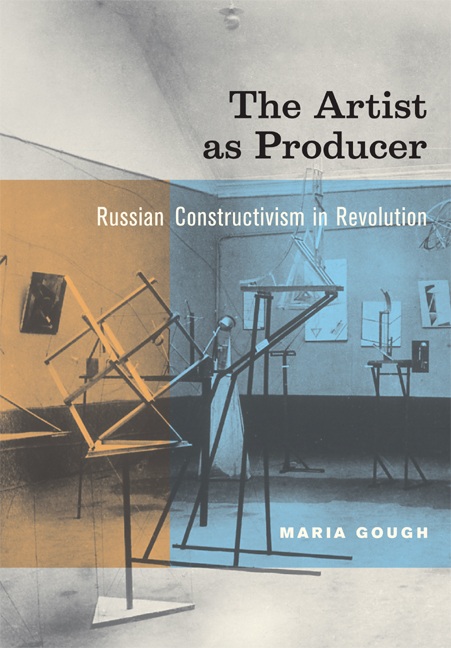Maria Gough: The Artist as Producer: Russian Constructivism in Revolution (2005)
Filed under book | Tags: · 1920s, architecture, art, art history, art theory, avant-garde, communism, composition, constructivism, electricity, formalism, functionalism, politics, productivism, revolution, russia

“The Artist as Producer reshapes our understanding of the fundamental contribution of the Russian avant-garde to the development of modernism. Focusing on the single most important hotbed of Constructivist activity in the early 1920s—the Institute of Artistic Culture (INKhUK) in Moscow—Maria Gough offers a powerful reinterpretation of the work of the first group of artists to call themselves Constructivists. Her lively narrative ranges from famous figures such as Aleksandr Rodchenko to others who are much less well known, such as Karl Ioganson, a key member of the state-funded INKhUK whose work paved the way for an eventual dematerialization of the integral art object.
Through the mining of untapped archives and collections in Russia and Latvia and a close reading of key Constructivist works, Gough highlights fundamental differences among the Moscow group in their handling of the experimental new sculptural form—the spatial construction—and of their subsequent shift to industrial production. The Artist as Producer upends the standard view that the Moscow group’s formalism and abstraction were incompatible with the sociopolitical imperatives of the new Communist state. It challenges the common equation of Constructivism with functionalism and utilitarianism by delineating a contrary tendency toward non-determinism and an alternate orientation to process rather than product. Finally, the book counters the popular perception that Constructivism failed in its ambition to enter production by presenting the first-ever case study of how a Constructivist could, and in fact did, operate within an industrial environment. The Artist as Producer offers provocative new perspectives on three critical issues—formalism, functionalism, and failure—that are of central importance to our understanding not only of the Soviet phenomenon but also of the European vanguards more generally.”
Publisher University of California Press, 2005
ISBN 9780520226180
xi+257 pages
Reviews: Paul Wood (Art Journal, 2006), Charlotte Douglas (Modernism/modernity, 2006), Elizabeth Kridl Valkenier (Russian Review, 2006), Patricia Railing (Slavic Review, 2007), Douglas Greenfield (Slavic and East European Journal, 2007), Roann Barris (SECAC Review, 2007).
PDF (21 MB, no OCR)
Comment (1)R. Bruce Elder: Harmony and Dissent: Film and Avant-garde Art Movements in the Early Twentieth Century (2008)
Filed under book | Tags: · abstract cinema, art history, avant-garde, cinema, colour, constructivism, dissent, experimental film, film, film history, film theory, marxism, modernism, music, occultism, productivism, revolution, suprematism, symbolism, theology

“R. Bruce Elder argues that the authors of many of the manifestoes that announced in such lively ways the appearance of yet another artistic movement shared a common aspiration: they proposed to reformulate the visual, literary, and performing arts so that they might take on attributes of the cinema. The cinema, Elder argues, became, in the early decades of the twentieth century, a pivotal artistic force around which a remarkable variety and number of aesthetic forms took shape.
To demonstrate this, Elder begins with a wide-ranging discussion that opens up some broad topics concerning modernity’s cognitive (and perceptual) regime, with a view to establishing that a crisis within that regime engendered some peculiar, and highly questionable, epistemological beliefs and enthusiasms. Through this discussion, Elder advances the startling claim that a crisis of cognition precipitated by modernity engendered, by way of response, a peculiar sort of “pneumatic (spiritual) epistemology.” Elder then shows that early ideas of the cinema were strongly influenced by this pneumatic epistemology and uses this conception of the cinema to explain its pivotal role in shaping two key moments in early-twentieth-century art: the quest to bring forth a pure, “objectless” (non-representational) art and Russian Suprematism, Constructivism, and Productivism.”
Publisher Wilfrid Laurier University Press, Waterloo, 2008
ISBN 1554580285, 9781554580286
480 pages
Review: David Sterritt (Quarterly Review of Film and Video, 2011).
PDF (updated on 2019-12-14)
Comments (7)Kathi Weeks: The Problem with Work: Feminism, Marxism, Antiwork Politics, and Postwork Imaginaries (2011)
Filed under book | Tags: · autonomy, basic income, capitalism, critique, feminism, fordism, labour, marxism, politics, postwork, production, productivism, value, work

In The Problem with Work, Kathi Weeks boldly challenges the presupposition that work, or waged labor, is inherently a social and political good. While progressive political movements, including the Marxist and feminist movements, have fought for equal pay, better work conditions, and the recognition of unpaid work as a valued form of labor, even they have tended to accept work as a naturalized or inevitable activity. Weeks argues that in taking work as a given, we have “depoliticized” it, or removed it from the realm of political critique. Employment is now largely privatized, and work-based activism in the United States has atrophied. We have accepted waged work as the primary mechanism for income distribution, as an ethical obligation, and as a means of defining ourselves and others as social and political subjects. Taking up Marxist and feminist critiques, Weeks proposes a postwork society that would allow people to be productive and creative rather than relentlessly bound to the employment relation. Work, she contends, is a legitimate, even crucial, subject for political theory.
Publisher Duke University Press, 2011
a John Hope Franklin Center Book
ISBN 0822351129, 9780822351122
304 pages

